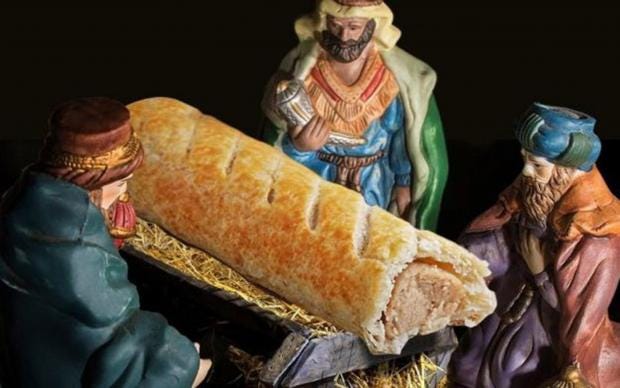
In a genius marketing move or a brainfart, Greggs the Great British High Street bakery did a sausage-of-Nazareth nativity scene for its Advent calendar that went viral. As a form of self-flagellation, I listened to the backlash about this unexpected pork-based blasphemy on a radio phone-in. It was pretty early on into the festivities that the phrase “They wouldn’t do this to the Muslims” was proffered as reasoned, un-seasoned and a very seasonal form of analysis by callers to the aforementioned radio show.
This religiously incorrect “they wouldn’t do this to the Muslims” straw man could have been dispelled by the host of the show – Jesus (Isa AS) is a revered prophet for Muslims, and as any self-respecting patriot knows, pork-based products are kryptonite for Muslims and especially Mosques, yet it was treated as Informed Comment and echoed by many callers during the show.
Now, I’m not privy to the private machinations of Greggs HQ, but I am willing to bet my steak bake that this bangers and nativity scene probably wasn’t an actual unholy trinity between ISIS, Iran and the bakery’s PR team, to make Dave with the crusader knight profile picture incandescent with rage. So why mention Muslims and Islam at all, and more importantly, why no pushback from those who should know better?
In trying to explain the phenomenon of linking Muslims with something as innocuous and non-Muslim related as a pasty-based marketing ploy, you have to name it, so I did. I call it Mohammed’s Law, named after my favourite uncle who is always complaining “what’s that got to do with Islam?” upon reading something in the papers that had nothing to do with Islam or Muslims but nonetheless mentions either or both.
Mohammed’s Law asserts that as an online discussion grows longer or a radio phone-in on LBC gets to its third caller, the probability of a comparison involving Muslims/Islam approaches; that is, if an online or radio discussion (regardless of topic or scope) goes on long enough, sooner or later someone will compare something non-Muslim related (sausage rolls) to something Muslim related (Ramadan).
Mohammed’s Law is an offshoot of blaming British Muslims for everything that 1.6 billion Muslims around the world might do, to just blaming Muslims for everything because it just feels right. It’s the jumping of the figurative gun in relation to the Oxford Circus panic, whereby the Daily Mail and an assortment of far-right agitators started to speculate/salivate that it was terror-related and/or most probably Muslim related, or at the very least something to do with gangs of rampaging immigrants – when the vast majority of publications and responsible tweeters (apart from Olly Murs) rightly held back on speculation.
So what is the genesis of Mohammed’s Law? You can trace its baby-in-the-manger birth to the comment section of any number of “there’s halal in our water!” stories in national papers and far-right publications. It gained further traction on social media championed by far-right celebrities their figurative hats upturned for donations and glory. For a while, Mohammed’s Law was underground: a punky, edgy take. Then it gained respectability and has in the past few years gone mainstream.
But in 2017 it’s reaching a dangerous tipping-point now we’re talking about a ‘Muslim Problem’, a term straight out of the Nazi playbook used to demonise Jews in the 30’s.
This obsession with commenting about Muslims and anything Islam-related is not just confined to British Muslims as some amorphous and foreign “other” to be scrutinised and linked to something on a Greggs menu at Christmas. Attacks on visible Muslims are also the norm. If you follow the likes of Mehdi Hasan on Twitter and read the comments left for him when tweeting something mundane; within a couple of minutes you’ll see responses like “Your Prophet is a paedo.”
But it goes further than Islamophobic comments on social media; Muslims are increasingly being questioned for being Muslim and doing a job, even if it has nothing to do with their religion, as witnessed in an op-ed piece by Kelvin McKenzie on Fatima Manji that asserted that because she was a visible Muslim in a headscarf this was offensive and she shouldn’t be doing her job and reporting on the Nice ISIS-inspired terror attack.
Islamophobia has, as Baroness Warsi once suggested, passed the dinner table test and is now prevalent in every comment section or radio phone-in, even if recipient or subject matter has no connection to Islam. It’s in the non-threatening actions of Nadiya Begum sharing Christmas recipes and getting backlash for being Muslim and appropriating Christmas from the same vocal sectors of society who for the preceding months and days share stories about Muslims from Birmingham – and its always Muslims from Birmingham – trying to cancel Christmas and not integrating enough.
The Muslim community in the UK has become a recognised measure of how bad or good a certain topic is, or whether or not it deserves prominence in the news cycle of the day depending on whether it has a Muslim protagonist. “We wouldn’t do that to the Muslims” and its bedfellow “But what about the Muslims?” has become a lazy trope, a yardstick for how all society is now judged.
No comments:
Post a Comment